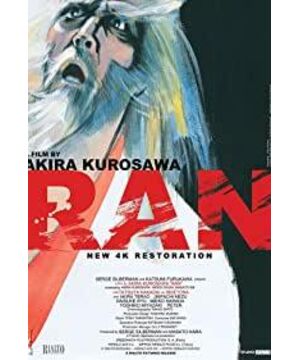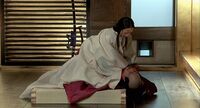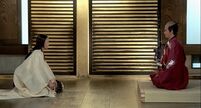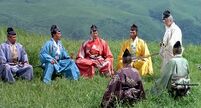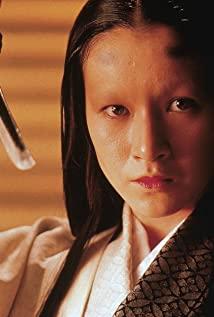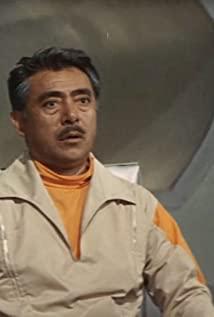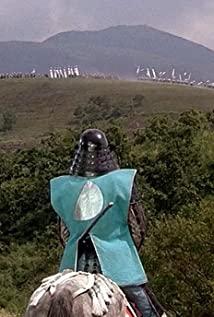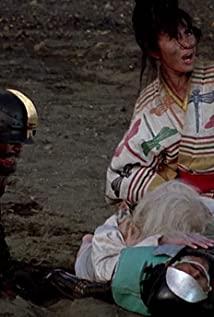Without men, there would be no wars and strife. In this way, the y chromosome seems to be damned, but it is also biased. After all, this is only the genetic nature of male animals, and only the competition of the same kind can make genes survive and inherit. Humans claim to be advanced animals, or think that they have already jumped out of the trap of animal nature and built a temple of civilization, dedicated to reason and free will, but they still cannot get rid of the control of genes. The fool Zhao Xiaojia in "Sandalwood Punishment" got a magical tiger beard and held it in his hand. People who are high-sounding on weekdays have turned into beasts. "Ran" borrows a family tragedy during the Warring States Period in Japan to give us a glimpse of the beasts of mankind. cage and beast. The name of the protagonist of the caged beast is almost explicit. The lord's family all end with the character tiger. Tiger is the king of animals, but one mountain cannot tolerate two tigers. As a powerful carnivore, tigers know more about territorial awareness and the truth of competing with others. However, in the human animal world, the identities of predators and prey can be switched at any time. It is a pleasure to open a group of people hunting pigs. The old protagonist, who has not yet lost his power, is very big-hearted and compares himself to a wild boar. After shooting the gun, he has indeed become a wild boar hunted by everyone. From the previous low-camera shot, occupying the center of the screen, to the top shot and always in the lower position, the change of perspective means the loss of position. After the madness, just like the unintentional words of the actor and Saburo, he turned into a timid and cowardly rabbit and ran away from here to there. It seems that An Yi will indeed relax the animal nature of people and be deceived by their own lies. Most of the names of the retainers and the remnants of the previous dynasty also correspond to animals, such as horses and cranes, which are unfaithful horses and detached cranes; Drill down, and the locust is the animal that greedily devours everything. Erlang's subordinates warned him that Mrs. Feng was a vixen, but the vixen still had a trace of humanity. The primitive man completed the evolutionary leap through the use of tools, and the tools in human society are weapons. Erlang's resourceful and ruthless retainer is called Heijin, and black gold is the symbol of weapons. The territory of high-level animals is the city, and leaving the city is surrender. The old master who gave way was expelled from the city of his sons, and he went madly to the ruins of the city where he was defeated. Not only did he not recognize what city it was, but he also forgot who he was. He was in heaven and hell for a while. He who lost the city lost society. Identity and strength values. Mrs. Erlang and her blind brother came to the ruins of their old city, but the blind brother asked "where is the city?" over and over again. They were losers and no longer had their own means of survival. Survival materials need symbols on the spiritual level, and the city is only one of them: after Dalang ascended the throne, he couldn’t wait to get back the one his father took away. A flag that symbolizes kingship; after the old protagonist went mad, the actor made him a straw hat helmet, and he gained a short-lived peace. The battle helmets of the sons are the symbols of strength. With the development of productive forces, human beings have transformed from cannibalism to co-habitation and cooperation. In order to maintain stability, a prototype of the law has been invented to maintain stability, and ethical and moral social systems have been invented based on this. The clan and caste system evolved into a patriarchal system, and the patriarchal system has far-reaching influence to this day. China's patriarchal system originated in the Xia, Shang and Zhou dynasties, and Zhou Wangfeng used this as a guarantee to divide the feudal feudal lords. The first collapse of the patriarchal system was the Spring and Autumn Period and the Warring States Period when the feudal lords competed for hegemony. However, after the unification of the Qin Dynasty, the patriarchal system was restored to its original state, because it was the root of the idea of being loyal to the monarch and loving the country and the world, and the ruler needed it to consolidate his rule. The patriarchal system was the first animal cage. Men are directly oppressed by patriarchy within the hierarchical system. Throughout human history, all emperors have died because the emperor is the top of the food chain of patriarchy. When the old master was in power, he engaged in arranged marriages, and the sons obeyed without any objection, and actively maintained the majesty of their father; after the fall of the old master, he delusionally thought that the sons could respect their father, but Dalang felt disgusted as long as he saw his father still in the city. , In the chaotic times of the Warring States period when the patriarchal system collapsed, the father became the object that those who compete for power must get rid of, and human civilization such as filial piety has disappeared. Extraordinarily funny. Integrity and morality are the second cage. If people want clothes to cover their body and shame, they are essentially covering up their desires. The bamboo doors on the four walls of the reception room of the palace have dense straight lines, which are reminiscent of a literal cage. In the cage of the bestiality, Dalang humiliated his father, everyone conspired to betray, Erlang seized power from the elder brother's widow Mrs. Feng, and Mrs. Feng Huangque did not hesitate to pull all the bamboo doors when she used Erlang later, letting the shameful Bestiality is completely obscured. Civilization tradition is the third cage. Colored military flags and armors are symbols of territory and belongings. The monarch uses color as a symbol, and his subordinates also regard the monarch as a symbol. The vassals and Mrs. Feng, who are possessed of ghosts, spare no effort to use Dalang and Erlang to achieve their own goals and desires. Saburo's old husband seems to value Saburo's character, but in fact, he is just a tool. . At the beginning of the film, the color of the country is yellow and black. The oppressive black and the sickly yellow are a cover for the bestiality; each prince has his own color, and in the fierce battle for hegemony, all the colors have become bright and violent. Blood red. Red is a direct symbol of bestiality, and colorful is a reference to it cover up. After Erlang seized power, he changed into a bright red battle uniform, no longer concealed his animal desires, and abandoned all concerns. His army used red as the flag; everyone in the film had red clothes on their bodies. According to the relationship of power, some Direct exposure, and some hidden under other clothing. If colorful is the cover of the strong, white is the protective color of the weak. The clothes of the brothers and sisters in distress are mainly white. After the old master went crazy, he covered his bright red thermal underwear with a white robe; Saburo's father-in-law, as the defeated general of the old master, the color of the army was white. The father-in-law's army, who watched the tiger fighting in the mountains, was arrogant and proud of the white flag. White means surrender, and the surrenderer can still occupy a sneaky place in the hierarchy of the beast. When the upper class is in distress, he takes off his coat and exposes the fur of the beast. Religion is the fourth cage. Religion originates from people's imagination of a superior power, and this divine superior power never manifests in reality, and almost all religions encourage people to endure the current pain in exchange for the ethereal afterlife. As Ah Cheng said, bulls, ghosts, snakes and gods are all the externalization of human subconsciousness. Weak human beings instinctively become Ah Q and learn the method of spiritual victory. Religion and even classical philosophy are on the side of the weak, because the strong never reason and do not need to deceive themselves. The brothers and sisters who lost their country did not choose to be deadly women like Madam Feng, but prayed to God every day to pray for liberation; at the end of the film, the portrait of Buddha given to him by the elder sister of the blind brother who lost all his relatives fell weakly down the cliff. The chaos in the animal world is reflected in the film as random winds, random grass, random arrows, random horses, random troops, and random cicadas, as well as spiritual confusion and madness. Chaos is the metal crashing sound of iron chains rubbing against the cage when the shackles on the cage are opened. As the crazy actor said, only madness can survive in this world. You can't be madly mad, only madly mad, so the old master is in chaos. Give up dignity in the sound, die mentally in the chaos, and fall into madness in the chaos. Chaos is the chaos of the herd. After the old protagonist went crazy, he actually started "picking Wei" on the hillside. Confucian classics sing praises to Boyi Shuqi who collected Wei, and think that because King Wen of Zhou did not abide by Confucian ethics and morals, his father went to war before his bones were cold, and left the Zhou Dynasty nursing home to live in seclusion in the mountains, and starved to death gloriously. But in Lu Xun's version, the image of Boyi Shuqi is more in line with the confused old people in troubled times. They are madmen, stupid and abandoned by the trend of the times. In the second half of the film, all the cages are opened, the actors, loyal ministers and Saburo are undoubtedly idealistic characters, so Saburo died, and the old master followed, all the idealists are very sad, the cover of human nature is completely removed from the world disappear on. Only the blind, what's he I couldn't see anything, I stood on the edge of the cliff and tried, I was so scared that I couldn't understand. The cliff symbolizes the abyss of cover-up and lies, blinding the eyes and blinding people to it. Quoting Mo Yan's passionate words in "Red Sorghum": "Under normal circumstances, a strong moral force will intimidate the beasts living in the crowd to cover their bristles with beautiful clothes. A stable and peaceful society is human beings. Just like tigers, leopards and wolves in a cage for a long time, they will be contaminated with the upper part of human nature. Will it? Will it? Will it? Will it? If I am not a man, if I have a killer in my hand Knife, I will kill all the men in the world!" The animal world has always existed, but we are "humans", so we refuse to recognize the animal nature of "humans". "If I were not human, if I had a killing knife in my hand, I would kill everyone in the world!" As an important part of the Chinese cultural circle, Japan is deeply influenced by traditional Chinese culture. As an agricultural country in need of stability, Confucianism has been transformed into China's way of governing the country. Pre-Qin Yuan Confucianism represented the declining slave-owner aristocracy at that time, and was neglected by the rulers, and Legalism prevailed. In the period of Emperor Wu of the Han Dynasty, Dong Zhongshu's transformation of Han Confucianism was actually an external Confucianism and an internal law. Confucianism became the cloak of barbaric and cunning Legalist thought, and it was even more intensified in the Song and Ming Confucianism. . The so-called Confucianism is a basket into which everything is placed, and what is placed in it is animal nature, and the basket is "human nature". Japan has few land and many people, and it is easy to break out peasant uprisings. In order to maintain stability, this kind of repression has intensified and evolved into a national character with a strong repression color. Such repression has also caused modern Japanese society to exceed the standard of abnormality, and the people have serious psychological problems and commit suicide. High rate. When it comes to suicide, this may be a breakthrough in human beings in terms of animal nature. After all, survival is an instinct, and being forced to commit suicide can be regarded as the flower of civilization spawned by the repressive culture of human society. I can't help but think of the questioning from "Advanced Animals", where is the happiness? Happiness may be in a cage, but is happiness in a cage really happiness? Akira Kurosawa's "Crazy" is a sharp blade pierced at Japan and human society. It criticizes the cage and the animal nature, but it is helpless. Just like Shakespeare's play, it can only use the images full of symbols to bring us a sigh. Human nature is the same. Will it? Will it? Will it? If I were not a man, if I had a killing knife in my hand, I would kill all the men in the world! "The animal world has always existed, but we are "humans", so we refuse to recognize the animal nature of "humans". "If I were not human, if I had a killing knife in my hand, I would kill everyone in the world!" As an important part of the Chinese cultural circle, Japan is deeply influenced by traditional Chinese culture. As an agricultural country that needs stability, the transformed Confucianism has become China's way of governing the country. Pre-Qin Confucianism represented the declining slave-owner aristocracy at that time. , was neglected by the rulers, and Legalism prevailed. During the period of Emperor Wu of the Han Dynasty, Dong Zhongshu transformed Han Confucianism, in fact, it was outside Confucianism and internal law, and Confucianism became the cloak of barbaric and cunning Legalist thought. The reformed Confucianism is a perverted repression, and it is also a perverted perversion of repression. The so-called Confucianism is a basket, everything is put in it, and the basket is "human nature". Japan has few people and is prone to peasant uprisings. In order to maintain stability, this is This kind of repression has intensified and evolved into a national character with a strong repression color. Such repression has also caused modern Japanese society to exceed the standard of abnormality, the people's psychological problems are serious, and the suicide rate is extremely high. Speaking of suicide, this may be the animal nature of human beings. After all, survival is an instinct, and being forced to commit suicide can be regarded as the flower of civilization spawned by the repressive culture of human society. I can’t help but think of the question from “Advanced Animals”, where is happiness? Happiness may be in a cage, but a cage Is the happiness in it really happiness? Akira Kurosawa's "Chaos" is a sharp blade pierced at Japan and human society, criticizing the animal cage and the animal nature, but it is helpless. Just like Shakespeare's drama, it can only use images full of symbols, Bring us a sigh. Human nature is the same. Will it? Will it? Will it? If I were not a man, if I had a killing knife in my hand, I would kill all the men in the world! "The animal world has always existed, but we are "humans", so we refuse to recognize the animal nature of "humans". "If I were not human, if I had a killing knife in my hand, I would kill everyone in the world!" As an important part of the Chinese cultural circle, Japan is deeply influenced by traditional Chinese culture. As an agricultural country that needs stability, the transformed Confucianism has become China's way of governing the country. Pre-Qin Confucianism represented the declining slave-owner aristocracy at that time. , was neglected by the rulers, and Legalism prevailed. During the period of Emperor Wu of the Han Dynasty, Dong Zhongshu transformed Han Confucianism, in fact, it was outside Confucianism and internal law, and Confucianism became the cloak of barbaric and cunning Legalist thought. The reformed Confucianism is a perverted repression, and it is also a perverted perversion of repression. The so-called Confucianism is a basket, everything is put in it, and the basket is "human nature". Japan has few people and is prone to peasant uprisings. In order to maintain stability, this is This kind of repression has intensified and evolved into a national character with a strong repression color. Such repression has also caused modern Japanese society to exceed the standard of abnormality, the people's psychological problems are serious, and the suicide rate is extremely high. Speaking of suicide, this may be the animal nature of human beings. After all, survival is an instinct, and being forced to commit suicide can be regarded as the flower of civilization spawned by the repressive culture of human society. I can’t help but think of the question from “Advanced Animals”, where is happiness? Happiness may be in a cage, but a cage Is the happiness in it really happiness? Akira Kurosawa's "Chaos" is a sharp blade pierced at Japan and human society, criticizing the animal cage and the animal nature, but it is helpless. Just like Shakespeare's drama, it can only use images full of symbols, Bring us a sigh. The basket, where everything is put in it, is the animal nature, and the basket is the "human nature". Japan has few land and many people, and it is easy to break out peasant uprisings. In order to maintain stability, this kind of repression has intensified and evolved into a national character with a strong repression color. Such repression has also caused modern Japanese society to exceed the standard of abnormality, and the people have serious psychological problems and commit suicide. High rate. When it comes to suicide, this may be a breakthrough in human beings in terms of animal nature. After all, survival is an instinct, and being forced to commit suicide can be regarded as the flower of civilization spawned by the repressive culture of human society. I can't help but think of the questioning from "Advanced Animals", where is the happiness? Happiness may be in a cage, but is happiness in a cage really happiness? Akira Kurosawa's "Crazy" is a sharp blade pierced at Japan and human society. It criticizes the cage and the animal nature, but it is helpless. Just like Shakespeare's play, it can only use the images full of symbols to bring us a sigh. The basket, where everything is put in it, is the animal nature, and the basket is the "human nature". There are few people in Japan, and it is easy to break out peasant uprisings. In order to maintain stability, this kind of repression has intensified and evolved into a national character with a strong repression. This kind of repression has also caused modern Japanese society to exceed the standard of abnormality, and the people have serious psychological problems and commit suicide. High rate. When it comes to suicide, this may be a breakthrough in human beings in terms of animal nature. After all, survival is an instinct, and being forced to commit suicide can be regarded as the flower of civilization spawned by the repressive culture of human society. I can't help but think of the questioning from "Advanced Animals", where is the happiness? Happiness may be in a cage, but is happiness in a cage really happiness? Akira Kurosawa's "Crazy" is a sharp blade pierced at Japan and human society. It criticizes the cage and the animal nature, but it is helpless. Just like Shakespeare's play, it can only use the images full of symbols to bring us a sigh.
View more about Ran reviews


